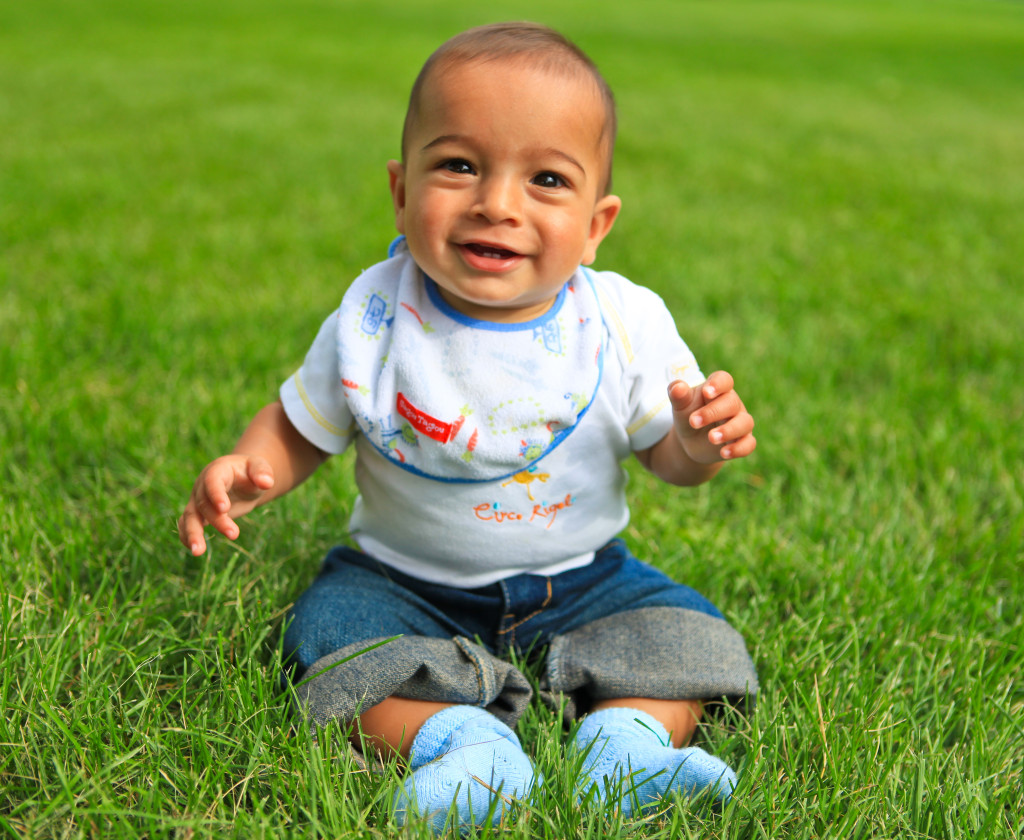
So you are a first-time mom (or second-time mom, it doesn’t matter really, for mothers always get anxious when it is about their babies), looking online to find out if your little darling baby is doing all right, even though he/she does seem to be doing all right! And you are setting off a wide range of Google searches, but all you get in return is vague statements on every self-proclaimed, baby-care expert website.
How do you find out then, that your baby is actually registering a normal, healthy growth and is happy for real? We are here to help you figure out this dilemma. In this article, you are going to find a list of 10 signs that are sure-shot indicators of a healthy baby and that he/she is doing just fine. Do read on…
Table of Contents
1) Your baby is calmed by your presence
You must realize that before he/she started breathing in this world, your baby spent 9 months in closed quarters and your voice was a big part of her existence back then. So if you find that your newborn pays attention to every time you talk to him/her, it means that he/she recognizes your voice and is a clear indication that your baby’s emotional growth is on track. This calming effect can also be observed when you try to calm your newborn with your voice, while he/she is crying. At that moment, you are simply mimicking the surroundings that your baby used to enjoy when he/she was in your womb, and that soothes him/her.
2) Your baby requires frequent breast-feeding
Babies are born with a built-in sucking reflex, which is triggered as soon as something is placed in their mouth. If your newborn sucks strongly and feeds frequently, it is a sign of a healthy appetite and normal digestive system development. If your baby makes a swallowing sound or action while feeding, it means that he/she is getting enough milk and is feeding normally. A healthy baby also appears quite content during and post-feeding and usually, falls asleep while feeding. This habit of falling asleep should happen less often though, as the baby grows.
3) You change 4-6 wet diaper a day
All healthy newborns, whether being breast fed or formula fed, should be wetting four to six diapers in a day. It is a sign that he/she is getting enough milk and is properly hydrated. Also, he/she must register continuous and visible weight gain during the first few weeks. A young baby who wets fewer diapers or does not show significant gains in his/her weight over time, might not be getting enough milk in her diet. A dark urine is also a sign of your baby being dehydrated (or underfed) and that his/her bowels are not moving well enough.
4) Your baby seems to have become quiet and attentive
Once your baby approaches the 1-month mark, he/she will appear to be more quiet and attentive to her surroundings (especially you). Contrary to the first few weeks where all he/she did was cry, feed and sleep, your baby slowly begins to quiet down and appear more alert when awake. This is the time when your baby has begun to gain control of her eye muscles and is learning to focus on a particular object (you mostly!).
5) Your baby reaches appropriate height (and weight) level
According to mayoclinic.org, babies grow 1/2 to 1 inch and gain 5 to 7 oz per week during the first 6 months of their life. In fact, a healthy baby should be almost doubling his/her weight every 5 months and by the time he/she reaches the 1-year mark, the weight should have tripled! Registering the suggested growth rate is a confident sign that your baby is getting good nutrition and is in good health.
6) Your baby responds to new sounds
Despite being able to hear right from the beginning, babies are only able to distinguish the meaningful sound from white noise much later during their growth period. At first, they will begin to find certain sounds to be more interesting (such as a hysterical laughter or a loud burp) than others (such as the dull noise of water flowing from a tap). Eventually, they will learn to appreciate the sound of music, whether it comes from a toy or a TV. When you can see your baby reacting to a sound and turning in its direction, you can be assured that his/her hearing system is developing fine and he/she is growing curious about what is happening around him/her!
7) Your baby recognizes patterns, colors and tracks movement
Believe or not, your baby lying still in your lap looking blankly at the rotating ceiling fan is also a sign of his/her progress! When born, they have a poor eyesight of about 20/100, which improves with growth. By the time they are two months old, babies can track movement in front of them and recognize various colours and patterns lying around. However, they do not possess depth perception or a perfect colour vision, which is why they tend to get more attracted to highly contrasting colours.
8) Your baby makes eye contact and smiles(!)
Usually, babies learn to maintain eye contact by the end of 1 month, they are able to smile by the second and by the time they are 4 months old, they can laugh out loud (lol!). All these interactions are mini milestones, that show that your baby is connecting with you and is becoming aware of his surroundings. Interestingly enough, by the time he/she reached 5 months of age, a baby will almost always smile back (whether or not he/she wants to) when someone smiles at him/her. And when you find that your baby has begun to make cooing sounds and babbles, it is him/her preparing to speak her first words!
9) Your baby cries little and sleeps regularly now
The first glimpses of a routine being developed in your baby’s life are actually the result of his/her nervous system maturing. Look out for the emergence of multiple naps during the day and stretches of four or more hours between feeding at night. Four months is the usual time babies take to reach this stage, but if your baby is older than that and is still showing no signs of settling into a habit, try making his day a bit more strictly scheduled.
10) Your baby can support her own weight
When they are a month old, a lot of babies (not all) are capable of lifting their heads up ever so briefly! By the 3-month stage, they are capable of doing it more often and easily and are also able to lie down on their tummy and push on their legs when placed on a flat surface. These are the signs of him/her learning to flex the growing muscles responsible for making movements. Six months old babies are known to be able to roll over both ways and sit up at times and by the end of the first year, expect them to crawl, pull him/herself to a stand and walk with support! However, some babies are known to show an ability to walk quite late (up to 2 years), even though they are perfectly fine health wise. A good, long duration of tummy time during the early months is key to preventing this delay.
